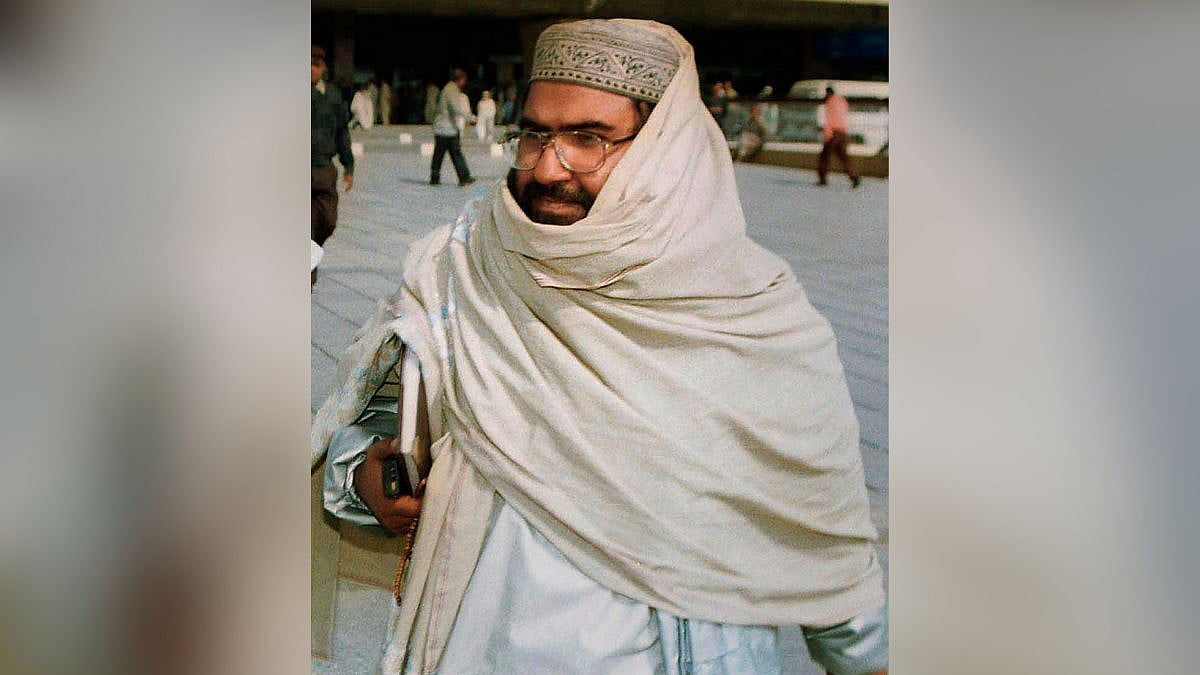From Orchestrating Massacres To Mourning His Own: The Twisted Tale Of Terror Kingpin Masood Azhar
In a twist of poetic justice, Maulana Masood Azhar—the man who orchestrated the massacre of countless innocents in Kashmir, whose blood-soaked hands are a grim testament to his reign of terror—has now tasted the bitter anguish of loss. For years, he revelled and caroused in the suffering of others, orchestrating a symphony of death from the shadows, his twisted ideology sustained by the Pakistani army's patronage.
Notwithstanding the devastation of nine terror camps, the Indian army’s strike on Markaz Subhan Allah in Bahawalpur—his breeding ground of terror—shattered his false sense of invincibility. Ten of his family members were wiped out, leaving Azhar, the self-proclaimed warrior, drenched in grief. His voice trembled with sorrow as he glorified their deaths in the florid language of jihad, calling them a "lucky caravan."
Against the backdrop of the Indian army’s precision to dismantle terror camps, beneath this façade, there was a man stripped of his arrogance, forced to confront the agony he so liberally inflicted on others. This is the monster who dared to dream of martyrdom while turning Kashmir into a graveyard. For once, Masood Azhar felt the agony he has sown dating back to his release by the Indian government 26 years back.
For the Pakistan Army, this is merely a statistic. For decades, they have discarded lives—of their own citizens, of brainwashed youth, and of Kashmiris—like expendable pieces in their deadly game. Generals in Rawalpindi smile and shake hands in global forums, pretending to be champions of peace, while their proxies plant bombs in crowded markets and shoot down innocents.
The world must see this charade for what it is. The so-called "freedom fighters" are nothing more than pawns in Pakistan's grand design—a design built on blood, lies, and betrayal. And at its center stands Masood Azhar, a coward who glorified death until it touched his own family. But perhaps, in that moment of grief, there was a fleeting and ephemeral moment of truth—a realization that the fire he has stoked for years now threatens to consume him too.
For decades, the blood of innocents has stained the serene valley of Kashmir, and behind this bloodshed lurks a sinister alliance—a pact between the terror kingpins of Pakistan and their military handlers. At the heart of this unholy nexus stands Maulana Masood Azhar, a man who has wielded terror like a weapon, orchestrating ruthless attacks on Indian soil while hiding behind the shield of Pakistan’s state patronage.
Masood Azhar was not always the feared terror lord he became. His rise to infamy began in 1999, when India was forced to release him along with two other dreaded terrorists in exchange for the safe return of 176 hostages on board Indian Airlines Flight IC-814, which had been hijacked by Pakistan-backed militants. The plane, which began its journey in Kathmandu, was diverted to Kandahar, Afghanistan—then under Taliban control. India, cornered and desperate to save innocent lives, had no choice but to negotiate with the terrorists. The release of Masood Azhar became a national tragedy, a decision that continues to haunt the country.
Walking free from an Indian prison, Azhar wasted no time in unleashing his venom. He founded Jaish-e-Muhammed, a terror outfit that quickly became synonymous with bloodshed. His men executed brutal attacks, from the suicide bombings in Pulwama to the ruthless killings of soldiers and civilians alike.
 Terrorist organisation Jaish-e-Mohammed (JeM) chief Masood Azhar
Terrorist organisation Jaish-e-Mohammed (JeM) chief Masood Azhar Masood Azhar’s hands are soaked with the blood of countless civilians, soldiers, and children. As the chief architect of Jaish-e-Muhammed, he transformed the organization into a factory of death, spewing hate and violence under the pretence of jihad. His men have unleashed terror from the suicide bombings of Pulwama to the brutal killings of Kashmiri Pandits. And yet, the real horror lies in the impunity with which he has operated—sheltered, funded, and armed by the very Pakistan military generals who should have denounced him.
For over two decades, Pakistan’s Army and its notorious intelligence wing, the Inter-Services Intelligence (ISI), have nurtured terror as a strategic tool. What began as a covert support to militants in the 1990s soon morphed into a full-blown state-sponsored terror apparatus . Pakistan’s generals, seated in their air-conditioned war rooms, drew maps of death, deploying young, brainwashed men across the Line of Control, promising them heaven in return for havoc. Thousands were trained in camps dotting the Pakistan-occupied Kashmir (PoK) region, their minds poisoned with hate, their hands armed with guns.
Markaz Subhan Allah in Bahawalpur, a Deobandi seminary and terror factory, became a key training ground. Here, under the guidance of ISI officers and hardened terrorists, young recruits were moulded into killing machines. It was here that Masood Azhar found his calling—a man whose sermons were laced with venom, who glorified death while hiding behind the safety of his patrons.
And yet, in a cruel twist of fate, the very architect of death was forced to taste the bitterness of grief. In the Indian strike on this very den of terror, ten of Azhar’s own family members perished. The man who had boasted of martyrdom and exalted death could only mutter words of sorrow, calling them part of a “lucky caravan.” But there was no valour, no divine victory—only a coward who glorified the slaughter of others but crumbled when death visited his own doorstep.
The world must see this charade for what it is. The so-called "freedom fighters" are nothing more than pawns in Pakistan's grand design—a design built on blood, lies, and betrayal. And at its center stands Masood Azhar, a coward who glorified death until it touched his own family.
But perhaps, in that moment of grief, there was a fleeting moment of truth—a realization that the fire he has stoked for years now threatens to consume him too.
(Writer is strategic affairs columnist and senior political analyst)
news